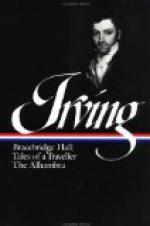I tell this honestly to the reader, lest when he find me dallying along, through every-day English scenes, he may hurry ahead, in hopes of meeting with some marvellous adventure farther on. I invite him, on the contrary, to ramble gently on with me, as he would saunter out into the fields, stopping occasionally to gather a flower, or listen to a bird, or admire a prospect, without any anxiety to arrive at the end of his career. Should I, however, in the course of my loiterings about this old mansion, see or hear anything curious, that might serve to vary the monotony of this every-day life, I shall not fail to report it for the reader’s entertainment.
For freshest wits I know will
soon be wearie
Of any book, how grave so
e’er it be,
Except it have odd matter,
strange and merrie,
Well sauc’d with lies
and glared all with glee.[A]
[Footnote A: Mirror for Magistrates.]
[Illustration: Breaking a Pointer]
The busy man.
A decayed gentleman, who lives most upon his own mirth and my master’s means, and much good do him with it. He does hold my master up with his stones, and songs, and catches, and such tricks, and jigs you would admire—he is with him now.
Jovial crew.
By no one has my return to the Hall been more heartily greeted than by Mr. Simon Bracebridge, or Master Simon, as the squire most commonly calls him. I encountered him just as I entered the park, where he was breaking a pointer, and he received me with all the hospitable cordiality with which a man welcomes a friend to another one’s house. I have already introduced him to the reader as a brisk old bachelor-looking little man; the wit and superannuated beau of a large family connection, and the squire’s factotum. I found him, as usual, full of bustle; with a thousand petty things to do, and persons to attend to, and in chirping good-humour; for there are few happier beings than a busy idler; that is to say, a man who is eternally busy about nothing.
I visited him, the morning after my arrival, in his chamber, which is in a remote corner of the mansion, as he says he likes to be to himself, and out of the way. He has fitted it up in his own taste, so that it is a perfect epitome of an old bachelor’s notions of convenience and arrangement. The furniture is made up of odd pieces from all parts of the house, chosen on account of their suiting his notions, or fitting some corner of his apartment; and he is very eloquent in praise of an ancient elbow-chair, from which he takes occasion to digress into a censure on modern chairs, as having degenerated from the dignity and comfort of high-backed antiquity.
Adjoining to his room is a small cabinet, which he calls his study. Here are some hanging shelves, of his own construction, on which are several old works on hawking, hunting, and farriery, and a collection or two of poems and songs of the reign of Elizabeth, which he studies out of compliment to the squire; together with the Novelists’ Magazine, the Sporting Magazine, the Racing Calendar, a volume or two of the Newgate Calendar, a book of peerage, and another of heraldry.




